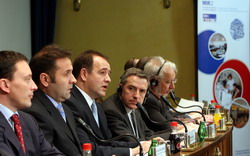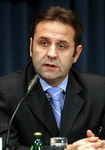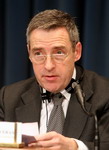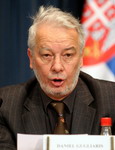Q:
A:
Second phase of MIR 2 programme begins
Belgrade,
13 February 2006
Representatives of the Serbian government, the European Union, the United Nations Development Programme (UNDP), and the Austrian, Swedish, and Norwegian governments inaugurated today the second phase of the MIR 2 programme dedicated to development and recovery of 13 municipalities of Pcinjski and Jablanicki districts. In the next two years the international partners will invest more than €10 million in this project.
Speaking at a press conference at the Serbian government building, Serbian Minister of Public Administration and Local Self- Government Zoran Loncar said that this project represents significant support, in both the economic and political sense, since that support is directed where it is most needed.
Loncar pointed out that the project presents further proof that the Serbian government supports decentralisation of authority, which is a condition for overall democratic development and should come into effect with a new constitution.
According to Loncar, it is vital that the decentralisation process runs simultaneously with balanced regional development of the republic, whereas the basic aim of the MIR 2 programme is to build the capacity of local authorities and train them for modern and effective administration.
Loncar stressed that this programme will also form the basis for international cooperation, which should lead to better connection and functioning of local self-governments.
Loncar pointed out that the project presents further proof that the Serbian government supports decentralisation of authority, which is a condition for overall democratic development and should come into effect with a new constitution.
According to Loncar, it is vital that the decentralisation process runs simultaneously with balanced regional development of the republic, whereas the basic aim of the MIR 2 programme is to build the capacity of local authorities and train them for modern and effective administration.
Loncar stressed that this programme will also form the basis for international cooperation, which should lead to better connection and functioning of local self-governments.
Head of the Coordinating Body for southern Serbia Rasim Ljajic said that in the past five years a partnership between the state, local self-governments and representatives of the European community has been demonstrated in southern Serbia, and recalled that more than 50 donators have aided the resolution of crisis in that region.
Ljajic said that in the past four years the Serbian government has invested 2 billion dinars in the municipalities of Presevo, Bujanovac and Medvedja, while international organisations contributed 1.5 billion dinars. These funds have been used for improving the quality of life in this region, but they have also drawn attention to specific problems in these municipalities.
Ljajic reiterated that the four major targets for southern Serbia in 2006 are building infrastructure, where the largest portion of funds will go, supporting development of SMEs, completion of the privatisation process and an increase in agricultural production.
He announced that this year the US government will invest $10 million in southern Serbia, which is 50% of the value of all projects planned in this region. The Serbian government will fund the remaining half.
Ljajic said that in the past four years the Serbian government has invested 2 billion dinars in the municipalities of Presevo, Bujanovac and Medvedja, while international organisations contributed 1.5 billion dinars. These funds have been used for improving the quality of life in this region, but they have also drawn attention to specific problems in these municipalities.
Ljajic reiterated that the four major targets for southern Serbia in 2006 are building infrastructure, where the largest portion of funds will go, supporting development of SMEs, completion of the privatisation process and an increase in agricultural production.
He announced that this year the US government will invest $10 million in southern Serbia, which is 50% of the value of all projects planned in this region. The Serbian government will fund the remaining half.
Head of the European Commission’s delegation to Serbia-Montenegro Josep Lloveras pointed to the significance of efforts the Serbian government and the international community have made to improve living standards in southern Serbia, a region often regarded as an area of potential instability after the events of 2000.
"It is important that we have learnt that there is an interconnection between economic stability and belief in a better future", stressed Lloveras and said that the past period has seen certain improvements.
"It is important that we have learnt that there is an interconnection between economic stability and belief in a better future", stressed Lloveras and said that the past period has seen certain improvements.
According to Head of the Operational Centre of the European Agency for Reconstruction (EAR) in Belgrade Daniel Giuglaris, stabilisation and general improvement of life in this part of Serbia need a strong incentive, which is why the MIR 2 programme has been initiated. Its realisation is possible only through partnership of all involved.
"Emphasis has been placed upon further training of municipal authorities to provide better quality service to all citizens. By the end of this project, which is planned for 2008, all citizens in this region should feel an improvement, which will be the best indicator of the programme's success", concluded Giuglaris.
"Emphasis has been placed upon further training of municipal authorities to provide better quality service to all citizens. By the end of this project, which is planned for 2008, all citizens in this region should feel an improvement, which will be the best indicator of the programme's success", concluded Giuglaris.















